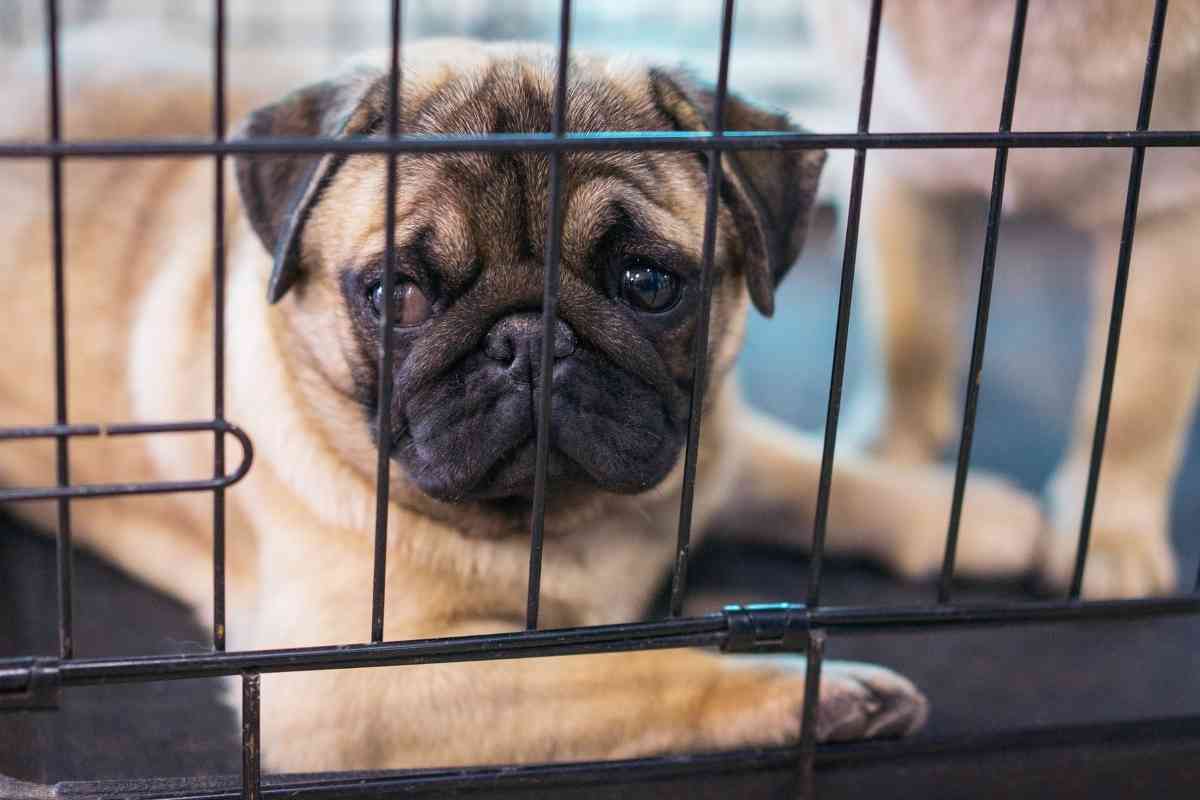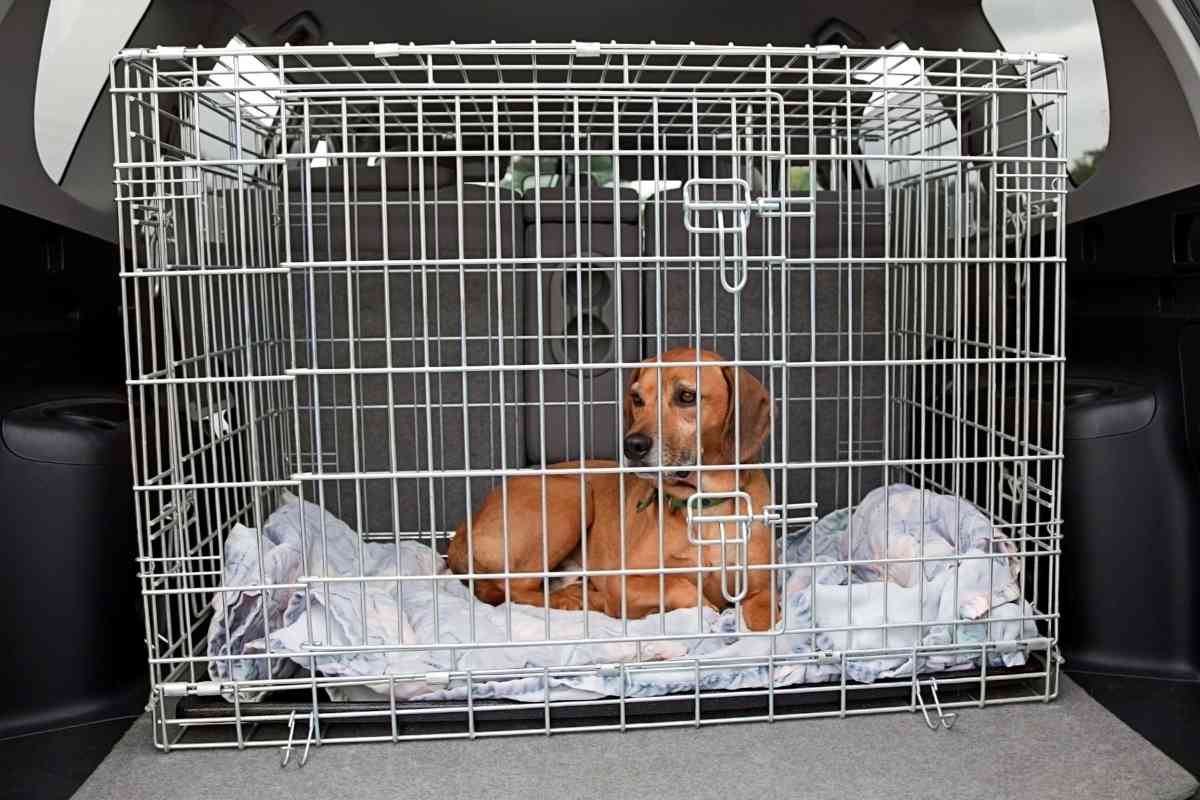6 Proven Ways To Stop Your Puppy From Pooping In Their Crate
If you have a puppy that has yet to be potty trained, you might want to know how to stop your puppy from pooping in their crate.

How do I get my puppy to stop pooping in the crate?
You can stop a puppy from pooping in their crate by setting a schedule for pooping, keeping track of time, getting your puppy’s health checked, observing your puppy closely, and making your puppy’s crate a comfortable place where they do not want to poop.
I’ve had several puppies that pooped in a crate many times before being potty trained. The main thing that got me through those times was being patient with each puppy and being persistent with our methods through the training process.
How To Stop Your Puppy From Pooping In The Crate
When I decided to become a dog owner, I knew it probably wouldn’t be a straightforward process to train my dog.
Though there were many things I wanted to train my dog as a puppy, one of my first concerns was to ensure my puppy wouldn’t poop in places they shouldn’t.
Dogs are a naturally clean animal and will typically feel uncomfortable with poop or anything dirty being near the place they sleep.
Though I didn’t always have an understanding of what would work well for a particular puppy, I always tried to work with the natural instincts that already existed within our puppies.
Even if our puppies didn’t seem to react quickly to certain adjustments we made, I tried to consistently stick to the plan and give our puppy time and space to adapt and improve.
Though it can be beneficial to follow general rules about puppies and learn from the tendencies of a puppy’s breed, one of the most important things I did when training our dog was to pay close attention to their particular habits and how they react to certain situations.
Some puppies may react well to a certain way you speak to them, but other dogs may not be able to detect the urgency or kindness you’re trying to communicate.
When a dog is a puppy, you should observe how they react to different bed setups and other environments.
Some puppies may find it more relaxing to poop at night or while they’re in a specific area like a yard.
Set A Schedule And Pay Attention To Time
Being aware of when your dog should poop is very important for putting them in the right place when it is time to poop.
When your dog goes outside for a walk, you should encourage them to poop before coming back in to prevent them from pooping in their crate. If you can’t do it yourself, hire a dog walker.
Since it may not be noticeable when some puppies poop, you should pay close attention to your puppy when they’re outside to make sure they actually poop.
If your dog is in a pooping stance but doesn’t actually poop, they might feel they completed their pooping duties.
However, you should leave your puppy out there for as long as you can to ensure they poop.
You shouldn’t rush your dog or talk to them in a threatening manner since that could make them uncomfortable and add to their pooping difficulties.
You want to make the potty training process as pleasant as possible for your puppy so they don’t attach any negative feelings to it.
Make Your Puppy’s Crate A Place They Don’t Want To Poop

Dog crates often contain blankets that some dogs may find comfortable to poop in.
If you notice your puppy is pooping in or around blankets, you may want to try removing some of the blankets or adjusting the way they are placed inside your puppy’s crate.
If there is too much space in your puppy’s crate, your puppy might find the crate roomy enough to poop somewhere in the crate without being bothered by it.
If you feel there is too much room in your puppy’s crate, you might want to consider getting them a larger crate so they don’t have as much space to poop.
Though dogs typically do not want to poop in a place where they relax and sleep, if your dog does not recognize its crate as a relaxing place where they sleep, your puppy may decide it’s fine to poop in the crate.
If your puppy sees the crate as just another place to lay down, they may just poop in it as they would anywhere else.
Though there are no set rules about how you should set up a crate, you should do whatever you can to make the crate a comfortable place that is pleasant for them to be in.
When I am raising a puppy, I try to put a few small blankets and comfortable objects inside their crate, but not too many to make them want to poop in them.
You should never act too aggressively or do anything that may make them feel uncomfortable while they’re in the crate.
You want to try to make your puppy feel as if the crate is a safe haven and associate good feelings with it.
When you make any major adjustments to your puppy’s living arrangements, you should try to make them quickly so that they don’t get too used to one setup or another.
Changing your puppy’s daily surroundings and routines too often might be very jarring to them.
Big and quick changes could upset your puppy and make it even harder for them to learn.
Feed Your Puppy A Healthy Diet
Like humans, puppies may have issues with their digestive system that might cause them to poop in places and at times they shouldn’t.
Your puppy might actually know they shouldn’t poop at a certain time and place, but their body may just force them to do it.
Being mindful of your puppy’s diet will help when it comes to proper digestion.
Feeding your puppy a healthy diet may prevent them from peeing or pooping at the wrong time and place.
You should feed your dog a well-balanced diet with enough vitamins, minerals, fiber, and protein to promote good health and digestion.
Since dogs may react to certain foods in different ways, you should pay attention to how your pup reacts to the foods you give them and adjust their diet accordingly.
The food you feed one puppy may be vastly different from foods you feed a different puppy.
If your puppy’s main diet doesn’t provide enough of the nutrients they need, you may want to supplement their diets with other foods that provide the missing nutrients.
Like humans, a puppy may have preferences for certain foods that another puppy might not like.
Even if you feed your dog healthy foods that are recommended by your veterinarian, they might feel disgusted by certain foods and end up having digestion issues from eating them.
Allowing your pet to drink plenty of water could go a long way with helping to regulate their digestive system and prevent them from pooping in their crate.
Use Treats To Reward Good Pooping Habits
One of the main things I do when potty training a puppy is to make it a fun and positive experience for them.
I try to give my puppy a treat after it successfully uses the bathroom outside or another suitable place outside their crate.
I use treats whenever possible when my puppy does anything positive related to pooping at the right time and place.
I feel my puppy is more attentive to the steps involved with proper pooping habits when I give them treats.
Get Your Puppy’s Health Checked
Another important step you should take before doing anything else, is to have your doctor give your puppy a thorough health check.
Make sure you understand all your puppy’s health conditions that might contribute to them pooping in their crate.
Whatever your doctor finds, you should try to treat the problem as soon as possible so your puppy can develop as healthily as possible.
Many behavioral and health issues are better resolved when dogs are young, so you should be very proactive about making adjustments to your dog’s life when they are a puppy.
Be Patient And Persistent When Training Your Puppy
I always try to understand that though things can get tough, sticking to a routine and being positive can greatly help my puppy in the long run.
Even though it could be a drag to have to get up at night to let your puppy poop, you should feel good knowing it may pay off after a few months when your puppy stops pooping in their crate.
If you can persevere through this early phase of bad behavior after a few months or however long it takes your puppy to get through it, you’ll be doing your puppy and your family a big favor.
You might actually end up saving money by not having to pay for expensive training sessions to fix pooping problems.
You should not blame yourself for not being able to stop your puppy from pooping in their crate.
There are only so many things you can do to get your puppy to do certain things.
When I’m teaching my puppy to stop pooping in its crate, I always try to remember it’s a long and gradual process that won’t happen overnight.
The most you can do sometimes is just wait and allow things to happen at their own pace.
Being persistent and not straying when you might get frustrating can help your puppy to develop in a healthy way.
I’ve never had a puppy that was able to learn everything properly the first time around.
You need to always remember that your puppy is going through a learning process that may take longer for them to learn things compared to other puppies you had.
Puppies can often feel when their owners are frustrated or upset, which could lead to the dog feeling anxious.
When a puppy feels anxious, it might prevent them from learning well and fixing problems they have with pooping.
Key Takeaways
- To get your puppy used to pooping within a set period of time, you should stick to a schedule when taking your puppy somewhere to poop.
- Since puppies typically poop within a certain amount of time after eating, you should monitor the time after they eat and place them in a poop-friendly place when it’s time to poop.
- When training your puppy to stop pooping in their crate, you should always be patient with your puppy and give them time to learn from their mistakes.